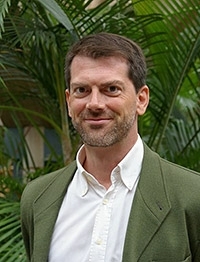In memoriam Harold M. Hays (1965-2013)
It is with profound sadness that we have learned of the passing of our colleague and friend, Dr Harold M Hays. Harold passed away on Wednesday 20 November, in his sleep, as a result of heart failure.
 |
| Dr. Harold Hays (1965-2013) |
Harold M. Hays (1965-2013)
Harold did his MA in Near Eastern Languages and Civilizations / Egyptology at the University of Chicago, where he went on to obtain the PhD degree with a thesis on the Pyramid Texts, in 2006. The same year, he was appointed University Lecturer in Egyptology at Leiden University, particularly for his expertise on the world’s oldest corpus of religious texts, the Pyramid Texts and Coffin Texts (c 2350-1900 BCE); and his experience, built up over five field seasons, as epigrapher in Luxor for the Epigraphic Survey of the University of Chicago since 2000.
Once he was established in Leiden, Harold began an ambitious reworking of his dissertation. This led to the publication of a major, two-volume monograph with Brill in 2012, entitled
The Organization of the Pyramid Texts: Typology and Disposition . This book has come to constitute the core of his published work, which further includes articles in leading journals and book chapters on the Pyramid Texts and on ritual practice. It proposes a major revision of the standard interpretations of the Texts, employing insights from linguistic anthropology to arrive at new groupings of the Texts, and new definitions of the motifs found in them. It is typical of Harold’s scholarship in the powerful conjunction of critical attention to detail and incisive, theoretically informed research questions. He was proud to have obtained a grant to enable its Open Access
publication.
The Organization of the Pyramid Texts will remain essential to future scholarship in Egyptology and beyond.
Teaching
As a teacher, Harold helped shape the intellectual and academic development of many students at Leiden University, and at the University of Groningen, where he taught in 2010. His classes included work on hieroglyphic Middle Egyptian, the classical phase of the language, in addition to Egyptian religion and other topics. His intellectual scope, his academic rigor, and his sense of humor and penchant for the theatrical made him an effective and popular teacher.
After his lecture series on Area Studies in the Leiden University BA program in International Studies in fall 2012, he was voted term’s best teacher by the students. At the Leiden University Institute for Area Studies, he intensively tutored several PhD students in Egyptology, and worked with different colleagues from the Schools of Middle-Eastern Studies and Asian Studies to build the PhD and Postdoc Seminar.
Colloquium
In 2009, Harold organized a colloquium in Leiden on the most famous literary text from ancient Egypt, the story of Sinuhe. His own talk was very much in character. It was part performance and part academic presentation, bringing in references to popular culture alongside theoretical considerations drawn from Egyptology and literary theory. His interests in various theoretical and methodological approaches and their application to Egyptology ranged far and wide, from discourse analysis, literary criticism, linguistic anthropology, and digital humanities, to modernity/ies and the construction of Western identity vis-à-vis the ancient world. As such, he made important contributions to the development of a local discourse on ‘new’ Area Studies, combining a high regard for the achievements of Oriental Studies with active engagement with critical theory after the linguistic turn.
Illness and recovery
From late 2012 to summer 2013, Harold suffered from an illness that gravely disrupted his personal and professional life. When he began to recover, this was a tremendous relief to those around him. He went about getting back on track with characteristic determination and focus, and with a great deal of interpersonal acumen, including the occasional ‘grin-and-twinkle and now let’s move on’ reference to what had been a very difficult period in his life.
Harold had developed new research plans, and just taught his first classes again – of which he said in as many words that they had made him realize anew that being a teacher and being part of the academic community was an integral part of his identity. Together with two colleagues, he had just submitted the Sinuhe-colloquium volume for publication in 2014. He was scheduled to resume full teaching duties in Egyptology in the spring, and was looking forward to joining a group of colleagues also engaged in the teaching of Area Studies in various settings and on various levels.
It is deeply tragic that fate cut Harold off from the decades of scholarship and community that lay ahead. Our thoughts are with his family and his friends, and his students and his colleagues. We will remember him for what he was: a true, inimitable presence.
Olaf Kaper, Professor of Egyptology, Leiden University
Maghiel van Crevel, Academic Director, Leiden University Institute for Area Studies
Correspondence: lias@hum.leidenuniv.nl.
